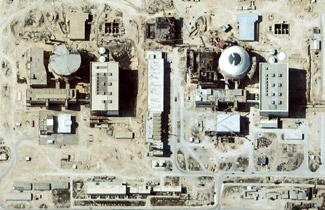AMMAN, Jordan, Aug. 28 (JTA) — Iran’s refusal to suspend uranium enrichment activities that could be used to produce atomic weapons is prompting both admiration and concern in the Arab world. Many Muslim Arabs admire the government in Tehran for defying Western demands to curb its nuclear program, but there also is significant concern among Arabs and their governments about Iran’s nuclear ambitions and the country’s sometimes-violent quest for greater power in the region. “Many Arabs believe that since Israel has nuclear weapons, why not balance this with Iranian nuclear weapons?” said Hani Hourani, director general of Al-Urdun Al-Jadid Research Center in Jordan. “At the same time, there are many Arabs in the Gulf countries and serious forces in the region, like Egypt and Saudi Arabia, worried about Iranian nuclear weapons.” It’s not just these states’ alliances with the United States that make Iran’s nuclear ambitions cause for concern. Countries like Saudi Arabia and the Persian Gulf states have their own disputes with the regime in Tehran. Iran and the United Arab Emirates have a territorial dispute over three islands in the Persian Gulf that Iran seized in 1971. Saudi Arabia and Iran routinely clash over oil policy, the restive Shi’ite minority in Saudi Arabia and Tehran’s suspected support for Al-Qaida, which opposes the Saudi government. The two countries back opposing sides in the conflict in Iraq, with Tehran behind Iraq’s Shi’ite militias and the Saudis more supportive of Sunni co-religionists. Similarly, Sunni-dominated countries with significant Shi’ite populations, like Jordan, Bahrain and Egypt, also worry about the growing power of Iran, which is dominated by Shi’ite clerics. They point to the country’s nuclear program and a possible “Shi’ite crescent” stretching from Iran to Lebanon — through a Shi’ite-dominated Iraq, a Tehran-friendly Syria and a Lebanon dominated by the Shi’ite militia Hezbollah — as a threat to the entire region’s stability. Perhaps just as significant as the religious divide between these Sunni regimes and the Shi’ites in Tehran is the ethnic dimension to this split, pitting Persians — the ethnic majority in Iran — against Arabs. Foad al-Khalafat, a former Muslim Brotherhood official in Jordan, told JTA he was approached not long ago by Iran’s ambassador in Amman as part of an Iranian attempt to cement its ties with Islamists in Jordan and extend its influence in the region. Khalafat said he heard Iran was making similar overtures in other Arab countries, including Egypt, Syria, Yemen and Algeria. Iran’s embassy in Jordan did not respond to e-mail inquiries for comment. Khalafat said he rejected the ambassador’s overture and that he would never cast his lot with the Iranians, who he said do not represent Arab interests. But he said he wouldn’t rule out some form of relationship with Iran in the future. Even as Iran rattles its war sabers, staging massive military exercises this week and last, some Arabs are pointing the finger at the Middle East’s favorite scapegoat for creating the Iranian problem: Israel. These Arabs say Israel’s presumed nuclear arsenal is the primary impetus behind Iran’s push to go nuclear, too. “I think the West allowing Israel to establish its nuclear capability has done the damage that we are all suffering from now. There are other countries that now are perhaps pursuing the same role,” the Saudi foreign minister said earlier this year. The solution, many suggest, is to eliminate Israel’s nuclear capability. If Israel dismantled its own nuclear arsenal, estimated at 75 to 200 warheads, Iran might be persuaded to forgo its own nuclear ambitions, they say. “There are many ways to influence Iran and meet these challenges. It’s not necessary to attack Iran,” Hourani said. “Egypt has suggested a nuclear-free Middle East. This is another answer.” Such a scenario is both naive and unlikely, according to experts in Israel. Though it doesn’t officially admit to having nuclear weapons — Shimon Peres confirmed it in an address to American Jewish leaders several years ago, but he was not part of the government at the time — Israel would never relinquish the tactical advantage it gets from being perceived as a nuclear power. And Iran, for its part, has shown no indication that it would forgo its own nuclear program, which it insists is for civilian purposes, if Israel disarmed — nor would Israel be likely to trust Iran’s promises. There also are suggestions in the Arab world that Israel and the United States could persuade Iran to forgo its nuclear ambitions through a strategy of appeasement. This scenario would have Israel completely withdraw from the West Bank, Gaza Strip and Golan Heights, and would see U.S. forces leave Iraq. “How can we stop this movement, the Shia interest in our area?” Abu Rashid said. “It’s easy if we solve the Iraqi problem and the Palestinian problem.” Such analyses ignore Tehran’s deadly track record of supporting terrorism, experts in Israel say. Iran funds Hezbollah, which invented a territorial dispute with Israel over the Shebaa Farms area — which the United Nations says never was part of Lebanon — to justify attacks against the Jewish state. Iran also provides material support for Palestinian terrorist organizations, supports Iraqi militants and is believed to have sponsored terrorist attacks worldwide, including the 1994 bombing of the AMIA Jewish community center in Buenos Aires, which killed 85 people. Mustafa Hamarneh, director of the Center for Strategic Studies at the University of Jordan, cautioned that Iran’s militant rhetoric should not be mistaken for the will to act. “They just talk, talk, talk. They don’t fight,” Hamarneh said. Whether Iran ultimately chooses to continue fighting its wars through proxies like Hezbollah or engage directly and more aggressively with its rivals in the region remains one of the Middle East’s most vexing, and uncertain, questions.
JTA has documented Jewish history in real-time for over a century. Keep our journalism strong by joining us in supporting independent, award-winning reporting.






